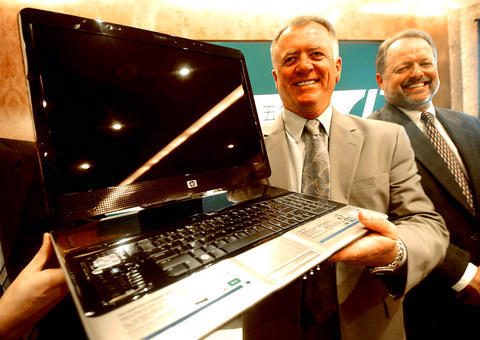Hewlett-Packard Co, the world's biggest personal computer maker, said yesterday notebook computer shipments would outgrow the overall market's 28 percent annual expansion this year, shrugging off a potential impact on demand from the US subprime credit turmoil.
"We tend to take IDC [market researcher projections] as a fact. Some macroeconomic [factors] may change things, but overall we continue to see the growing market," Ted Clark, a senior vice president of HP's notebook global business unit, told a press briefing in Taipei.
IDC said world laptop computer shipments would grow 28 percent year-on-year this year on strong demand, Clark said.

PHOTO: AFP
HP expects its growth will outpace that of the overall industry, Clark said. Latin America will grow fastest and the Asia-Pacific region will come second, with a narrow margin, he said.
"HP's notebook growth is on plan," Clark said.
The company's laptop business does not foresee cutback on orders, he said in response to a media inquiry regarding speculation in a Goldman, Sachs & Co report last week that orders for local desktop computer makers could slow down during the fourth quarter.
HP's Taiwanese suppliers include Quanta Computer Inc (
Clark was in Taipei yesterday to attend the 5th anniversary celebrations of HP's Product Development Center in Taiwan. Aside from Taiwan's facilities, the Palo Alto, California-based company has three other product design centers in China, Germany and the US for its notebook computer business.
HP said yesterday the company would double its workforce at the product design center in Taiwan to 600 people by the end of next year, with 90 percent of new employees hired locally.
The facilities, established in September 2002, primarily develop products for the global market and collaborate with local partners in product design and delivery.
Over the past five years, more than 50 notebook platforms were launched, with more than 100 derivatives, in the global market, the company said.

IN THE AIR: While most companies said they were committed to North American operations, some added that production and costs would depend on the outcome of a US trade probe Leading local contract electronics makers Wistron Corp (緯創), Quanta Computer Inc (廣達), Inventec Corp (英業達) and Compal Electronics Inc (仁寶) are to maintain their North American expansion plans, despite Washington’s 20 percent tariff on Taiwanese goods. Wistron said it has long maintained a presence in the US, while distributing production across Taiwan, North America, Southeast Asia and Europe. The company is in talks with customers to align capacity with their site preferences, a company official told the Taipei Times by telephone on Friday. The company is still in talks with clients over who would bear the tariff costs, with the outcome pending further

A proposed 100 percent tariff on chip imports announced by US President Donald Trump could shift more of Taiwan’s semiconductor production overseas, a Taiwan Institute of Economic Research (TIER) researcher said yesterday. Trump’s tariff policy will accelerate the global semiconductor industry’s pace to establish roots in the US, leading to higher supply chain costs and ultimately raising prices of consumer electronics and creating uncertainty for future market demand, Arisa Liu (劉佩真) at the institute’s Taiwan Industry Economics Database said in a telephone interview. Trump’s move signals his intention to "restore the glory of the US semiconductor industry," Liu noted, saying that

NEGOTIATIONS: Semiconductors play an outsized role in Taiwan’s industrial and economic development and are a major driver of the Taiwan-US trade imbalance With US President Donald Trump threatening to impose tariffs on semiconductors, Taiwan is expected to face a significant challenge, as information and communications technology (ICT) products account for more than 70 percent of its exports to the US, Chung-Hua Institution for Economic Research (CIER, 中華經濟研究院) president Lien Hsien-ming (連賢明) said on Friday. Compared with other countries, semiconductors play a disproportionately large role in Taiwan’s industrial and economic development, Lien said. As the sixth-largest contributor to the US trade deficit, Taiwan recorded a US$73.9 billion trade surplus with the US last year — up from US$47.8 billion in 2023 — driven by strong

STILL UNCLEAR: Several aspects of the policy still need to be clarified, such as whether the exemptions would expand to related products, PwC Taiwan warned The TAIEX surged yesterday, led by gains in Taiwan Semiconductor Manufacturing Co (TSMC, 台積電), after US President Donald Trump announced a sweeping 100 percent tariff on imported semiconductors — while exempting companies operating or building plants in the US, which includes TSMC. The benchmark index jumped 556.41 points, or 2.37 percent, to close at 24,003.77, breaching the 24,000-point level and hitting its highest close this year, Taiwan Stock Exchange (TWSE) data showed. TSMC rose NT$55, or 4.89 percent, to close at a record NT$1,180, as the company is already investing heavily in a multibillion-dollar plant in Arizona that led investors to assume